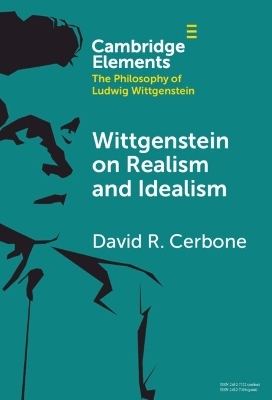
Wittgenstein on Realism and Idealism
Seiten
2024
Cambridge University Press (Verlag)
978-1-009-47563-1 (ISBN)
Cambridge University Press (Verlag)
978-1-009-47563-1 (ISBN)
This Element concerns Wittgenstein's evolving attitude toward the opposition between realism and idealism in philosophy. Wittgenstein can be understood as rejecting both positions, while nonetheless seeing insights in each position worth retaining. Wittgenstein was insistent on seeing language and thought as worldly phenomena.
This Element concerns Wittgenstein's evolving attitude toward the opposition between realism and idealism in philosophy. Despite the marked – and sometimes radical – changes Wittgenstein's thinking undergoes from the early to the middle to the later period, there is an underlying continuity in terms of his unwillingness at any point to endorse either position in a straightforward manner. Instead, Wittgenstein can be understood as rejecting both positions, while nonetheless seeing insights in each position worth retaining. The author traces these “neither-nor” and “both-and” strands of Wittgenstein's attitude toward realism and idealism to his – again, evolving – insistence on seeing language and thought as worldly phenomena. That thought and language are about the world and happen amidst the world they are about undermines the attempt to formulate any kind of general thesis concerning their interrelation.
This Element concerns Wittgenstein's evolving attitude toward the opposition between realism and idealism in philosophy. Despite the marked – and sometimes radical – changes Wittgenstein's thinking undergoes from the early to the middle to the later period, there is an underlying continuity in terms of his unwillingness at any point to endorse either position in a straightforward manner. Instead, Wittgenstein can be understood as rejecting both positions, while nonetheless seeing insights in each position worth retaining. The author traces these “neither-nor” and “both-and” strands of Wittgenstein's attitude toward realism and idealism to his – again, evolving – insistence on seeing language and thought as worldly phenomena. That thought and language are about the world and happen amidst the world they are about undermines the attempt to formulate any kind of general thesis concerning their interrelation.
1. Introduction; 2. The early Wittgenstein; 3. The middle Wittgenstein; 4. The later Wittgenstein; 5. Coda: On certainty; References.
| Erscheinungsdatum | 23.01.2024 |
|---|---|
| Reihe/Serie | Elements in the Philosophy of Ludwig Wittgenstein |
| Zusatzinfo | Worked examples or Exercises |
| Verlagsort | Cambridge |
| Sprache | englisch |
| Gewicht | 252 g |
| Themenwelt | Geisteswissenschaften ► Philosophie ► Sprachphilosophie |
| ISBN-10 | 1-009-47563-0 / 1009475630 |
| ISBN-13 | 978-1-009-47563-1 / 9781009475631 |
| Zustand | Neuware |
| Informationen gemäß Produktsicherheitsverordnung (GPSR) | |
| Haben Sie eine Frage zum Produkt? |
Mehr entdecken
aus dem Bereich
aus dem Bereich
Wie die Menschheit zu ihrer größten Erfindung kam
Buch | Softcover (2022)
C.H.Beck (Verlag)
CHF 25,20
Macht und Legitimität politischer Sprache im Prozess der europäischen …
Buch | Softcover (2023)
Nomos (Verlag)
CHF 103,60


